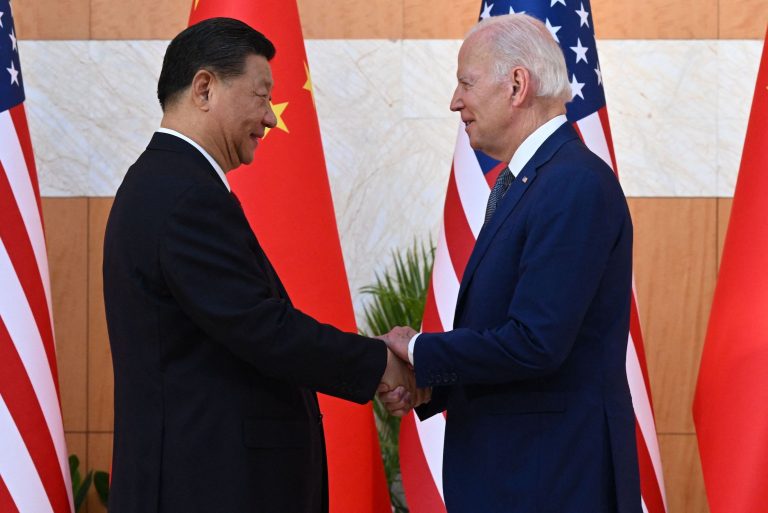U.S. President Joe Biden and Chinese leader Xi Jinping have agreed to meet on the sidelines of the upcoming Asia-Pacific Economic Cooperation (APEC) summit in San Francisco, as reported by the Associated Press citing an unnamed U.S. official on Oct. 27.
Details of the meeting have yet to be confirmed, such as its venue or exact date. The APEC summit is scheduled for Nov. 11 to Nov. 17.
On Oct. 28, the Wall Street Journal cited an American official as saying that Biden and Xi have “an agreement in principle” regarding an upcoming meeting at the APEC summit.
The same day, the People’s Republic of China (PRC) Foreign Ministry said that the “two sides agreed to work together to achieve a meeting of the two heads of state” of the U.S. and the PRC following a trip by Beijing’s top diplomat Wang Yi to Washington, D.C. on Oct. 26 and Oct. 27.
On Oct. 31, White House press secretary Karine Jean-Pierre confirmed the meeting in a press briefing. “Intense competition means intense diplomacy,” she told reporters.
No guarantee of ‘smooth sailing’
Success
You are now signed up for our newsletter
Success
Check your email to complete sign up
While the Xi-Biden meeting is likely to go ahead as announced, Wang said following his earlier trip that the road to improved U.S.-China relations would not be “smooth sailing” or happen on “autopilot.”
According to the Wall Street Journal’s report, PRC officials had told the outlet that “Beijing is concerned that the U.S. might do something—such as approving an arms sale to Taiwan—that would embarrass Xi or make sitting down with Biden politically difficult at home” with just weeks to go before the Chinese leader’s trip to San Francisco.
On Oct. 29 and Oct. 30, generals of the People’s Liberation Army (PLA), the armed wing of the Chinese Communist Party (CCP), gave remarks at the Xiangshan Forum in Beijing stressing the importance of “reunification” between Taiwan and the PRC, as well as China’s partnership with Russia.
Lt. Gen. He Lei, former vice president of the PLA’s Academy of Military Sciences, told the Party-run nationalist tabloid Global Times on Oct. 29 that a potential war to prevent Taiwan from officially declaring independence would not just be a conflict with Taiwan, but also against “external interfering forces.”
To that end, He said that bilateral relations between the U.S and Communist China hinged on having a “good military relationship” and vice versa.
Taiwan is officially governed as the Republic of China (ROC), which was forced to retreat from mainland China after its defeat there by the CCP in 1949. Beijing claims Taiwan as part of the PRC’s sovereign territory, while the pro-Taiwan independence Democratic Progressive Party (DDP) currently heads the ROC government.
On Oct. 30, Vice Chairman of the CCP’s Central Military Commission, Gen. Zhang Youxia, said that Communist China would “show no mercy” to supporters of an independent Taiwan, and stressed that Beijing “will deepen strategic cooperation and coordination with Russia.”
At the same time, “we are willing to develop military relations with the U.S. based on mutual respect, peaceful coexistence, and win-win cooperation,” Zhang claimed.
Seeking a thaw in relations?
Analysts at New York-based risk consultancy SinoInsider believe that the PRC’s recent rhetoric indicate that Beijing is looking for a temporary improvement in relations with the U.S. so as to alleviate some of the challenges currently facing the Xi leadership, namely China’s worsening economy, social crises, and East-West confrontations.
“The Biden administration has engaged in ‘intense diplomacy’ with the PRC while keeping up pressure with moves like tightening restrictions on China’s ability to buy advanced semiconductors and repeatedly urging Beijing to align itself with the U.S. and its allies in condemning Russia and Hamas,” SinoInsider noted in the Nov. 2 edition of its subscription newsletter.
“Meanwhile, the PRC’s domestic and external crises have continually worsened, including a noticeable economic decline, increasing signs of financial crisis, and a collapsing property sector.”
On Oct. 30, PRC officials honored the service of the “Flying Tigers” — U.S. pilots who deployed to China before and during World War II to help the ROC army defend against the Imperial Japanese Army.
“The Chinese people always remember the heroic deeds of the Flying Tigers and we will never forget our old friends,” PRC Vice President Han Zheng told American veterans Harry Moyer and Mel McMulle, who flew with the Flying Tigers.
SInoInsider pointed to Han’s honoring of the Flying Tigers, as well as the PLA generals’ statements favoring a “good military relationship” with the U.S., as signs that “despite the bellicose rhetoric and indirect criticisms, the Xi leadership is more willing to work with the Biden administration to improve the Sino-U.S. relationship than resort to aggressive behavior in the region.”
“The CCP has an incentive to improve Sino-U.S. relations so that it can buy time to resolve its serious domestic problems. The CCP is also likely looking to make good with the U.S. for the time being while it ‘delays and waits for changes,'” the analysts wrote.
To “delay and wait for change” is a Chinese term that essentially means to “buy time.” In the context of the CCP’s foreign relations, it hopes to make good with the U.S. so as to be able to wait for Washington to be distracted by other concerns, and then nudge the geopolitical situation in Beijing’s favor.
However, SinoInsider believes that the Xi-Biden meeting is unlikely to help the CCP dodge much of the troubles facing it due to both sides’ national security concerns, as well as the fundamental ideological differences between Communist China and the U.S.















